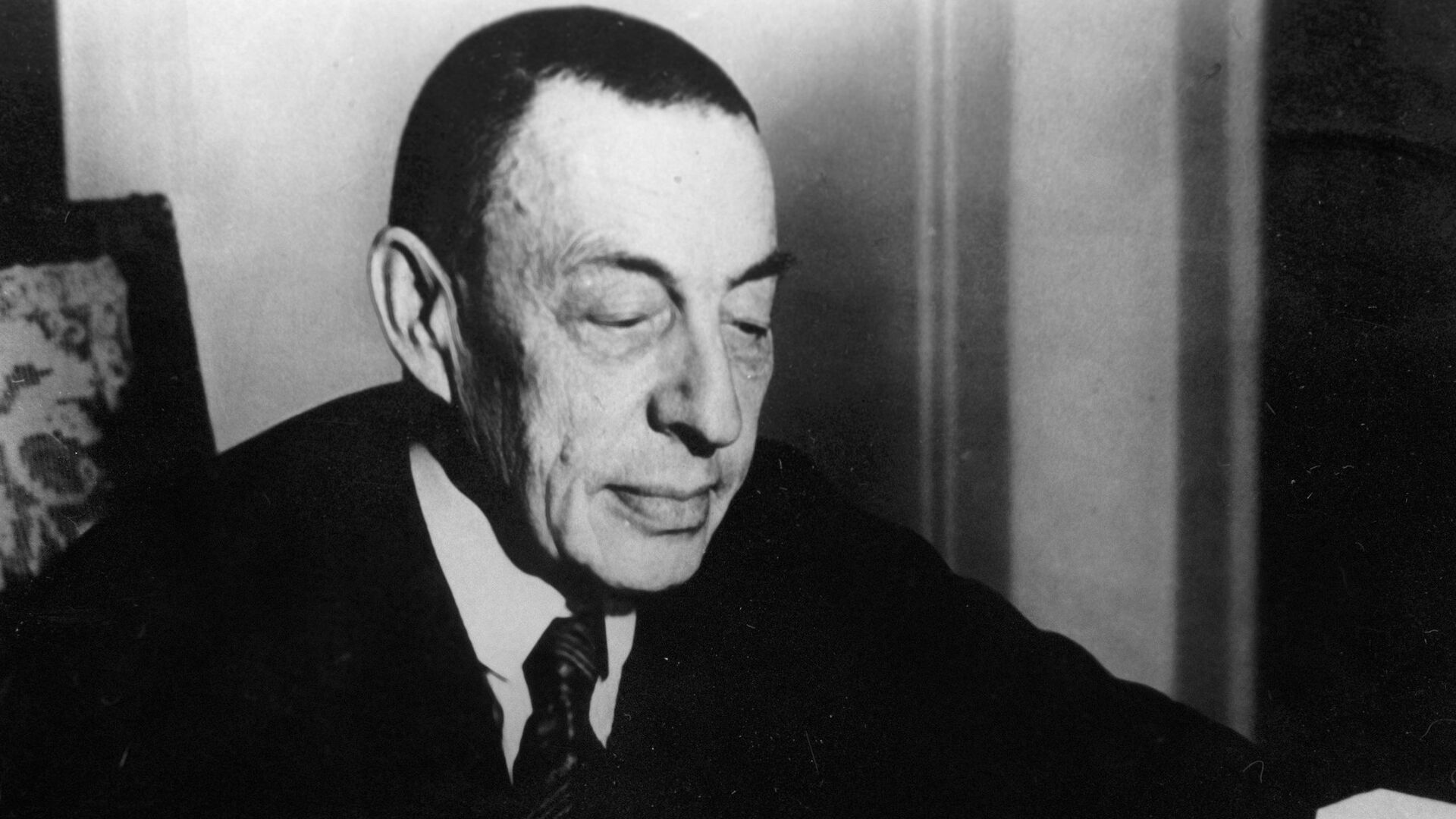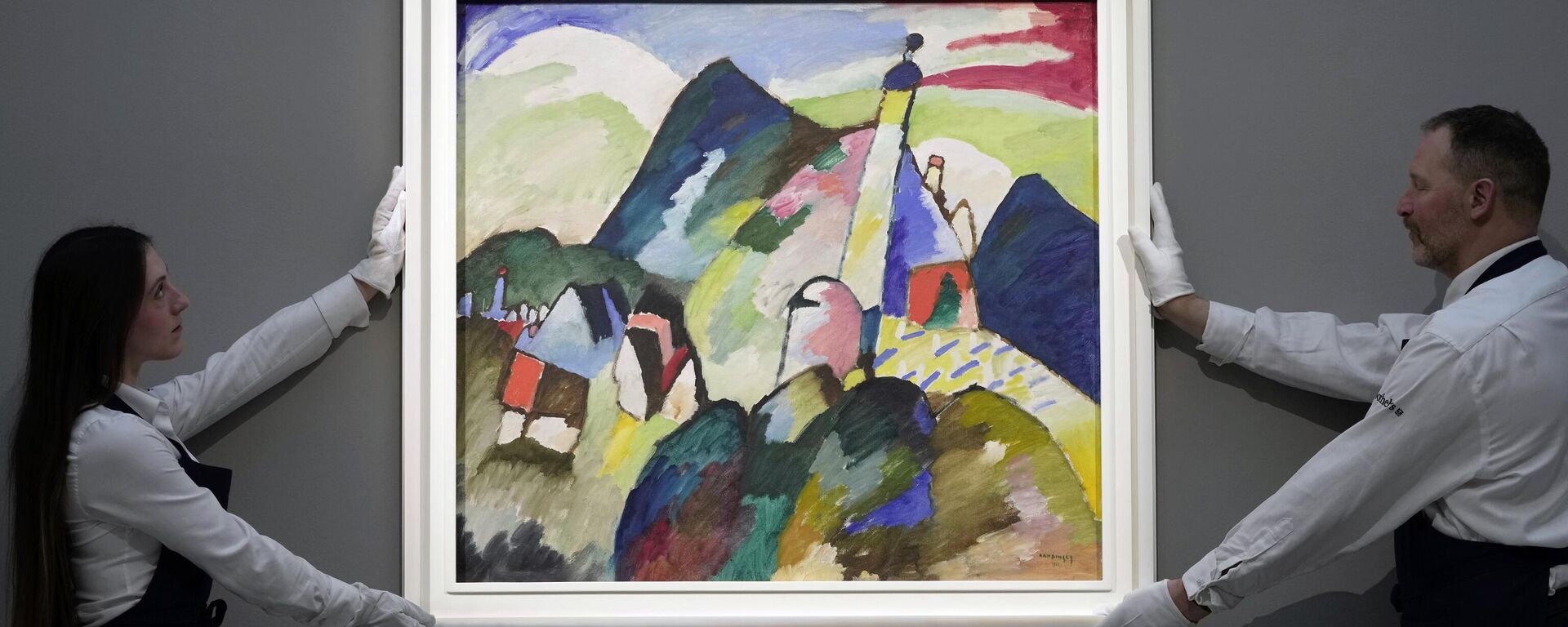https://sputnikglobe.com/20230417/rachmaninoffs-music-remains-powerful-unifying-force-1109599044.html
Rachmaninoff's Music Remains Powerful Unifying Force
Rachmaninoff's Music Remains Powerful Unifying Force
Sputnik International
Professor emerita of Russian Studies at Rhodes College in Memphis, Tennessee, Valeria Nollan, believes that Sergei Rachmaninoff's music shows the great unifying potential of culture and its ability to dismantle stereotypes.
2023-04-17T16:14+0000
2023-04-17T16:14+0000
2023-04-17T16:14+0000
world
russia
sergei rachmaninoff
music
https://cdn1.img.sputnikglobe.com/img/16035/48/160354885_0:0:2156:1213_1920x0_80_0_0_1334177e3f9e70a3f8fc78fe9976eb76.jpg
The distinguished composer, pianist and conductor Rachmaninoff was born in Russia on April 1 (March 20 in the old style), 1873. He left his homeland forever after the Bolshevik revolution in 1917 and settled in the US, where he spent most of the rest of his life. 2023 marks the 150th anniversary of the Russian composer's birth and 80th anniversary of his death. Culture and beauty bring people together, destroying stereotypes, she continued. "Values, faith traditions, and governments of countries may differ, but music is a powerful unifying force," Nollan added. "It is easier for a country to generate hatred for an unknown enemy, but far more difficult to hate a given people if they have read Dostoevsky’s Brothers Karamazov or Tolstoy’s Anna Karenina, have attended an Orthodox Christian liturgy, have watched one of Tchaikovsky's ballets, or have listened to Rachmaninoff’s Symphony No. 2 or Concerto No. 2," she said. A German-born Russian emigree who spent her adult life in the US, Nollan noted that Rachmaninoff had enormous popularity among Americans, but some experts especially during the 1920s and 1930s criticized him for not being a modernist. "American orchestras and music ensembles regularly program his music, because of its beauty and high compositional merits. Anecdotally, his Piano Concerto No. 2 in C minor is one of the most-performed works in the US," she said. His other masterpieces are also performed very often, she added. Nollan, who recently published the composer's biography Sergei Rachmaninoff: Cross Rhythms of the Soul (Lexington Books / Rowman & Littlefield, 2022), expressed her deep admiration for his music and fascination with his life. "I grew up in Russian emigration and understood the tragic situation of emigres who loved their native countries and cultures, but were separated from them geographically. I realized that outside of Russia, Rachmaninoff was not presented in the fullness of his Russian and Russian Orthodox identity, an identity that he himself stated was fundamental to understanding his music, and for this reason set about to rectify this inaccurate presentation of who he was," she said. When asked to explain why Rachmaninoff became practically the only Russian emigree to achieve the same level of success abroad as he had had at home, Nollan noted that after leaving Russia in December 1917, it actually took him over a decade before he could find himself financially and emotionally stable enough to resume composing music. At the same time, she added, many Russian musicians, such as Alexander Siloti, who was Rachmaninoff’s cousin, and Vladimir Horowitz, developed their musical creativity in different ways after they left Russia. Though Rachmaninoff belongs to the whole world, Nollan continued, he described himself as a Russian composer who created Russian music and who was inspired by Russian cultural sources. "He longed to return to Russia, but he also appreciated American life. He loved jazz and considered this art form to be the future of American music," she said. 2023 was declared as the Year of Rachmaninoff in Russia.
https://sputnikglobe.com/20230302/painting-by-russias-kandinsky-snapped-up-for-45-million-at-sothebys-auction-1107940755.html
https://sputnikglobe.com/20221222/russias-rich--inspiring-cultural-legacy-can-never-be-cancelled---russian-culture-foundation-1105692449.html
russia
Sputnik International
feedback@sputniknews.com
+74956456601
MIA „Rossiya Segodnya“
2023
Sputnik International
feedback@sputniknews.com
+74956456601
MIA „Rossiya Segodnya“
News
en_EN
Sputnik International
feedback@sputniknews.com
+74956456601
MIA „Rossiya Segodnya“
Sputnik International
feedback@sputniknews.com
+74956456601
MIA „Rossiya Segodnya“
sergei rachmaninoff, sergei rachmaninoff's music, who is sergei rachmaninoff
sergei rachmaninoff, sergei rachmaninoff's music, who is sergei rachmaninoff
Rachmaninoff's Music Remains Powerful Unifying Force
WASHINGTON (Sputnik) – Sergei Rachmaninoff's music shows the great unifying potential of culture and its ability to dismantle stereotypes and promote better understanding between peoples, despite differences in values and political systems, professor emerita of Russian Studies at Rhodes College in Memphis, Tennessee, Valeria Nollan, told Sputnik.
The distinguished composer, pianist and conductor Rachmaninoff was born in Russia on April 1 (March 20 in the old style), 1873. He left his homeland forever after the Bolshevik revolution in 1917 and settled in the US, where he spent most of the rest of his life. 2023 marks the 150th anniversary of the Russian composer's birth and 80th anniversary of his death.
"People have a hunger for beauty, harmony, and spirituality that penetrates beyond the superficial. They are startled and amazed at the depths of Russian artistic expression, its depths of meaning that plumb the riches and mysteries of the human being. Rachmaninoff’s music embodies these qualities," Nollan said.
Culture and beauty bring people together, destroying stereotypes, she continued. "Values, faith traditions, and governments of countries may differ, but music is a powerful unifying force," Nollan added.
"It is easier for a country to generate hatred for an unknown enemy, but far more difficult to hate a given people if they have read Dostoevsky’s Brothers Karamazov or Tolstoy’s Anna Karenina, have attended an Orthodox Christian liturgy, have watched one of Tchaikovsky's ballets, or have listened to Rachmaninoff’s Symphony No. 2 or Concerto No. 2," she said.
A German-born Russian emigree who spent her adult life in the US, Nollan noted that Rachmaninoff had enormous popularity among Americans, but some experts especially during the 1920s and 1930s criticized him for not being a modernist.
"American orchestras and music ensembles regularly program his music, because of its beauty and high compositional merits. Anecdotally, his Piano Concerto No. 2 in C minor is one of the most-performed works in the US," she said.
His other masterpieces are also performed very often, she added.
Nollan, who recently published the composer's biography Sergei Rachmaninoff: Cross Rhythms of the Soul (Lexington Books / Rowman & Littlefield, 2022), expressed her deep admiration for his music and fascination with his life.
"I grew up in Russian emigration and understood the tragic situation of emigres who loved their native countries and cultures, but were separated from them geographically. I realized that outside of Russia, Rachmaninoff was not presented in the fullness of his Russian and Russian Orthodox identity, an identity that he himself stated was fundamental to understanding his music, and for this reason set about to rectify this inaccurate presentation of who he was," she said.
When asked to explain why Rachmaninoff became practically the only Russian emigree to achieve the same level of success abroad as he had had at home, Nollan noted that after leaving Russia in December 1917, it actually took him over a decade before he could find himself financially and emotionally stable enough to resume composing music.
"He composed his major works during the summer periods in Europe, not during the concert season. After he left Russia, he completely stopped composing art songs – romances – and choral works, because he no longer had the availability of Russian singers and choirs in large numbers," she noted.

22 December 2022, 17:23 GMT
At the same time, she added, many Russian musicians, such as Alexander Siloti, who was Rachmaninoff’s cousin, and Vladimir Horowitz, developed their musical creativity in different ways after they left Russia.
Though Rachmaninoff belongs to the whole world, Nollan continued, he described himself as a Russian composer who created Russian music and who was inspired by Russian cultural sources.
"He longed to return to Russia, but he also appreciated American life. He loved jazz and considered this art form to be the future of American music," she said.
2023 was declared as the Year of Rachmaninoff in Russia.




